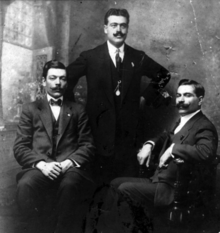Francesco Di Domenico (1880–1966)[1] and Vincenzo Di Domenico (1882–1955),[2] known together as the Di Domenico brothers, were Italian film directors who played an important role in Colombian cinema.
| |
|---|---|
 Francesco Di Domenico (right) and Vincenzo Di Domenico (left) with their cousin Giovanni | |
| Born |
|
| Died | |
| Nationality | Italian |
| Occupation | Directors |
| Known for | El drama del 15 de octubre |
Francesco was born on 1 August 1880 in Castelnuovo di Conza and died on 26 December 1966 in Villeta, Cundinamarca Department.[1] Vincenzo was born on 3 October 1882 in Castelnuovo di Conza and died on 12 July 1955 in Barcelona.[2]
In the early 1900s, economic growth in Colombia led to the rise of the film industry, including the construction of movie theatres.[3] The Di Domenico brothers moved to Bogotá in 1909,[4] where they founded the Latin American film industry company (Spanish: sociedad industrial cinematográfica latinoamericana) in 1913,[5][6] with their brothers Giuseppe and Erminio Di Ruggiero and cousins Donato and Giovanni Di Domenico Mazzoli.[6] Colombian film historian Luis Alfredo Álvarez regards their initiative as the first organised attempt of a Colombian national cinema.[5]
The Di Domenico brothers created a documentary after the assassination of General Rafael Uribe Uribe, known as El drama del 15 de octubre which was first screened to the public on 21 November 1915.[7][8] Regarded as the first feature documentary film of Colombia, the reconstruction of the murder, the usage of the assassins in the film,[9] and the images of General Uribe's body caused controversy,[10] which led to riots in some movie theatres.[9] The usage of the assassins of General Uribe in the reconstruction of the murder was described by many newspapers as "disgusting" and that it was "criminal glorification".[11] The controversy that this film caused led the brothers to cut the most controversial scenes of the film,[9] before it was banned in Colombia and subsequently destroyed.[12][13]
El drama del 15 de octubre was considered a resounding failure of the Di Domenico brothers,[12] but was later described by newspaper Mundo al día as a blockbuster despite the poor image quality.[14]
Filmography edit
| Year | Film | Directed by | |||
|---|---|---|---|---|---|
| Francesco | Vincenzo | ||||
| 1915 | El drama del 15 de octubre | Yes | Yes | ||
| 1915 | La hija del Tequendama | Yes | Yes | ||
| 1924 | Aura o las violetas | No | Yes | ||
| 1925 | Como los muertos | No | Yes | ||
| 1926 | El amor, el deber y el crimen | No | Yes | ||
Their cousin Donato Di Domenico also directed a film, Tierra caucana, in 1921.
References edit
- ^ a b "Francesco Di Domenico (I89)". Maurizio Abete. Retrieved 2 November 2014.
- ^ a b "Vincenzo Di Domenico (I101)". Maurizio Abete. Retrieved 2 November 2014.
- ^ Nieto, Jorge; Rojas, Diego (1992). Tiempos del Olympia (in Spanish). Bogotá: Fundación Patrimonio Filmico Colombiano. p. 132. ISBN 958-95510-1-7. Archived from the original on 22 April 2013. Retrieved 2 November 2014.
- ^ Silva, Hernando Salcedo (1981). "Entrevista con Donato Di Domenico". Crónicas del Cine Colombiano (in Spanish). Carlos Valencia Editores. Retrieved 2 November 2014.
- ^ a b Mora, Angélica-Maria Mateus (2012). Cinéma et audiovisuel latino-américain: l'Indien, images et conflits (in French). Paris: L'Harmattan. p. 73. ISBN 9782296997066.
- ^ a b Romero, Diego Rojas (April 1997). Cine colombiano : primeras noticias, primeros años, primeras películas (in Spanish). Revista Credencial Historia. Retrieved 2 November 2014.
- ^ Silva, Hernando Salcedo (1981). "Fin del periodo "primitivo"". Crónicas del Cine Colombiano (in Spanish). Carlos Valencia Editores.
- ^ Lorza, Juan (September 2007). Cine para el olvido (in Spanish). El Clavo. p. 24. ISSN 1794-4244.
- ^ a b c El'Gazi, Leila (April 1999). El drama del 15 de octubre (F. DiDomenico) (in Spanish). Bogotá: Revista Historia Credencial. Retrieved 2 November 2014.
- ^ Rivadeneira, Ricardo (23 January 2014). "El drama del 15 de octubre, Francesco y Vincenzo di Domenico" (in Spanish). Revista Arcadia. Archived from the original on 30 January 2020. Retrieved 2 November 2014.
- ^ Zuluaga, Pedro Adrián (28 January 2008). ¡Acción! Cine en Colombia (in Spanish). Colombian National Museum. p. 30. ISBN 9789588250380.
- ^ a b Zuluaga, Pedro Adrián (30 May 2004). "Noviembre 21 de 1915 : El cine que no pudo ser" (in Spanish). Semana. Archived from the original on 30 January 2020. Retrieved 2 November 2014.
- ^ "Años de Cine" (in Spanish). Bogotá: Revista Historia Credencial. September 2004. Retrieved 2 November 2014.
- ^ León, Juan Sebastián Ospina (2013). Discursos, prácticas, historiografía: continuidad y tableau en el cine silente colombiano (PDF) (in Spanish). p. 6. ISSN 1852-9550. Archived from the original (PDF) on 28 March 2014. Retrieved 2 November 2014.
{{cite book}}:|work=ignored (help)